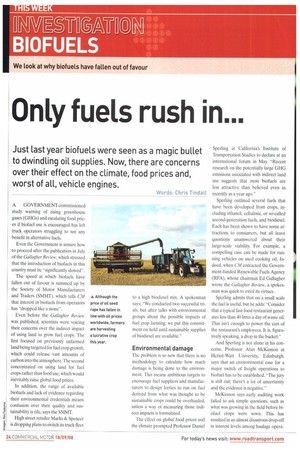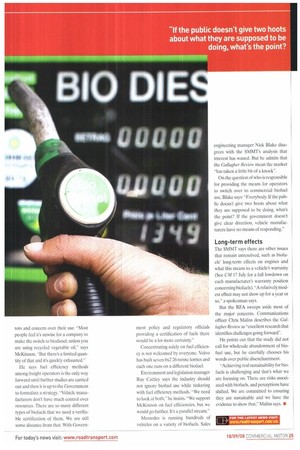Only fuels rush in...
Page 24

Page 25

If you've noticed an error in this article please click here to report it so we can fix it.
Just last year biofuels were seen as a magic bullet to dwindling oil supplies. Now, there are concerns over their effect on the climate, food prices and, worst of all, vehicle engines.
Words: Chris Tindall A GOVERNMENT-commissioned study warning of rising greenhouse gases (GHGs) and escalating food prices if biofuel use is encouraged has left truck operators struggling to see any benefit in alternative fuels.
Even the Government is unsure how to proceed after the publication in July of the Gallagher Review, which stressed that the introduction of biofuels in this country must be -significantly slowed-.
The speed at which biofuels have fallen out of favour is summed up by the Society of Motor Manufacturers and Traders (SMMT), which tells CM that interest in biofuels from operators has "dropped like a stone".
Even before the Gallagher Review was published, scientists were voicing their concerns over the indirect impact of using land to grow fuel crops. The first focused on previously unfarmed land being targeted for fuel crop growth, which could release vast amounts of carbon into the atmosphere. The second concentrated on using land for fuel crops rather than food use, which would inevitably raise global food prices.
In addition, the range of available biofuels and lack of evidence regarding their environmental credentials means confusion over their quality and sustainability is rife, says the SMMT.
High street retailer Marks 84 Spencer is dropping plans to switch its truck fleet to a high biodiesel mix. A spokesman says: "We conducted two successful trials, but after talks with environmental groups about the possible impacts of fuel crop farming. we put this commitment on hold until sustainable supplies of biodiesel are available."
Environmental damage
The problem is so new that there is no methodology to calculate how much damage is being done to the environment. This means ambitious targets to encourage fuel suppliers and manufacturers to design lorries to run on fuel derived from what was thought to be sustainable crops could be overhauled, unless a way of measuring those indirect impacts is formulated.
The effect on global food prices and the climate prompted Professor Daniel Sperling at California's Institute of Transportation Studies to declare at an international forum in May. "Recent research on the potentially large GHG emissions associated with indirect land use suggests that most biofuels are less attractive than believed even as recently as a year ago."
Sperling outlined several fuels that have been developed from crops, including ethanol, cellulosic, or so-called second-generation fuels, and biodiesel. Each has been shown to have some attractions to consumers, but all leave questions unanswered about their large-scale viability. For example, a compelling case can be made for running vehicles on used cooking oil. Indeed, when CM contacted the Government-funded Renewable Fuels Agency (RFA), whose chairman Ed Gallagher wrote the Gallagher Review, a spokesman was quick to extol its virtues.
Sperling admits that on a small scale the fuel is useful, but he adds: "Consider that a typical fast-food restaurant generates less than 40 litres a day of waste oil. That isn't enough to power the cars of the restaurant's employees. It is, figuratively speaking, a drop in the bucket."
And Sperling is not alone in his concerns. Professor Alan McKinnon at HeriotWatt University, Edinburgh, says that an environmental case for a major switch of freight operations to biofuel has to be established. -The jury is still out: there's a lot of uncertainty and the evidence is negative."
McKinnon says early auditing work failed to ask simple questions, such as what was growing in the field before biofuel crops were sown. This has resulted in an almost disastrous drop-off in interest levels among haulage opera tors and concern over their use. "Most people feel it's unwise for a company to make the switch to biodiesel, unless you are using recycled vegetable oil," says McKinnon. "But there's a limited quantity of that and it's quickly exhausted."
He says fuel efficiency methods among freight operators is the only way forward until further studies are carried out and then it is up to the Government to formulate a strategy. "Vehicle manufacturers don't have much control over resources. There are so many different types of biofuels that we need a verifiable certification of them. We are still some distance from that. With Govern ment policy and regulatory officials providing a certification of fuels there would be a lot more certainty" Concentrating solely on fuel efficiency is not welcomed by everyone. Volvo has built seven 6x2 26-tonne lorries and each one runs on a different biofuel.
Environment and legislation manager Ray Cattley says the industry should not ignore biofuel use while tinkering with fuel efficiency methods. "We need to look at both," he insists. "We support McKinnon on fuel efficiencies, but we would go further. It's a parallel stream."
Mercedes is running hundreds of vehicles on a variety of biofuels. Sales engineering manager Nick Blake disagrees with the SMMT's analysis that interest has waned. But he admits that the Gallagher Review mean the market -has taken a little bit of a knock-.
On the question of who is responsible for providing the means for operators to switch over to commercial biofuel use, Blake says: "Everybody. If the public doesn't give two hoots about what they are supposed to be doing, what's the point? If the government doesn't give clear direction, vehicle manufacturers have no means of responding."
Long-term effects The SMMT says there are other issues that remain unresolved, such as biofuels' long-term effects on engines and what this means to a vehicle's warranty (See CM 17 July for a full lowdown on each manufacturer's warranty position concerning biofuels). "A relatively modest effect may not show up for a year or so," a spokesman says.
But the RFA sweeps aside most of the major concerns. Communications officer Chris Matins describes the Gallagher Review as "excellent research that identifies challenges going forward".
He points out that the study did not call for wholesale abandonment of biofuel use, but he carefully chooses his words over public disenchantment.
-Achieving real sustainability for biofuels is challenging and that's what we are focusing on. There are risks associated with biofuels, and perceptions have shifted. We are committed to ensuring they are sustainable and we have the evidence to show that,Matins says. •












































































































































































